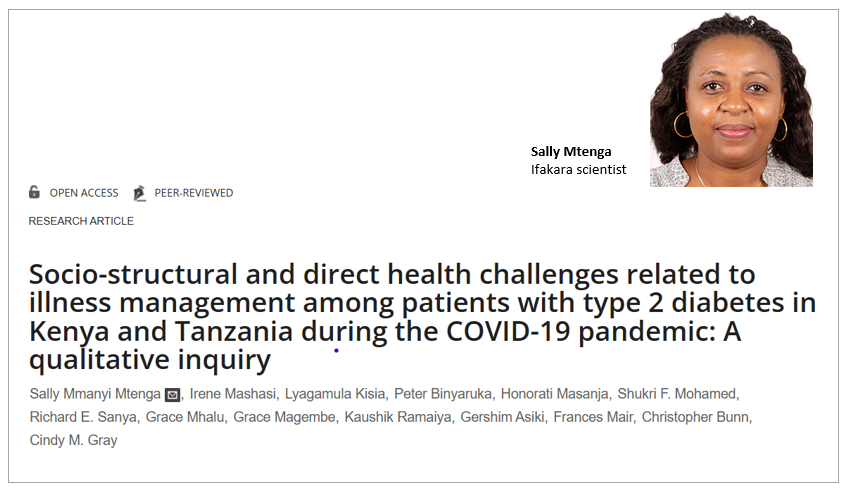
COVID-19: Lessons from pandemic push for better diabetes care in Tanzania, Kenya

The COVID-19 pandemic severely disrupted diabetes care in Tanzania and Kenya, exposing patients to worsening health conditions, financial hardship, and mental distress, according to a new study published on PLOS Global Public Health.
Led by Ifakara Health Institute social scientist Dr. Sally Mtenga, the study highlights the urgent need for countries to invest in stronger healthcare and social support systems that address the financial and psychological needs of individuals living with type 2 diabetes (T2D) – a chronic condition that affects how the body processes blood sugar which occurs when the body becomes resistant to insulin or doesn’t produce enough of it, leading to elevated sugar levels.
“Our findings highlight the need for targeted interventions to meet the healthcare, financial, and psychological needs of T2D patients. There is a need to ensure the provision of affordable comprehensive health insurance, economic support, and psychosocial services to help patients overcome mental distress,” the study’s authors emphasized.
The pandemic’s impact on patients
The multi-country study interviewed 52 people living with T2D across Kenya and Tanzania and found that, despite differing government responses to the pandemic—Kenya enforcing strict lockdowns and Tanzania adopting a lighter approach—patients in both countries faced remarkably similar challenges.
The pandemic made it harder for patients to access healthcare. Regular diabetic consultations were missed, clinics reported medicine shortages, and some diabetic centers in Dar es Salaam closed entirely. In Kenya, patients also struggled with soaring prices for essential medicines and test kits.
Financial instability, rising mental health challenges
Beyond health access issues, many patients experienced financial instability as businesses shut down and incomes decreased, with rising food prices making it harder to maintain recommended diabetic diets.
These pressures severely impacted mental health, with many patients reporting increased anxiety and distress about managing their diabetes during the pandemic—a pattern researchers believe reflects a broader vulnerability among people with chronic illnesses.
Turning to self-medication that worsened health outcomes
With clinics less accessible and financial pressures mounting, some patients turned to self-medication or missed doses altogether, leading to poor blood sugar control and a greater risk of complications.
The researchers warned that such vulnerabilities could leave millions across Africa with chronic diseases exposed during future emergencies, especially as diabetes prevalence on the continent is expected to reach 55 million by 2045.
Recommendations to protect diabetes patients
The study outlines several recommendations to better protect diabetes patients during future crises. First, it calls for emergency planning that specifically includes diabetes care.
"Advance contingency planning is essential to ensure continued access to routine diabetic consultation and treatment services during future pandemics or emergency situations," the authors stressed.
In addition, the study urges governments and stakeholders to provide affordable, comprehensive health insurance, economic support for patients, and expanded mental health services. Clear communication about where and how patients can access alternative services during emergencies is also critical, they noted.
A wake-up call for health systems
"If there is one thing this pandemic has shown us, it is that diabetes care needs to be a central component of the planning for the next emergency," the researchers emphasize.
They also highlighted the need for future studies to explore how emergency response programs at the primary health care level can be improved to meet the needs of patients with diabetes and other chronic illnesses. Making health insurance more affordable was another priority highlighted by the study team.
As the world prepares for future pandemics or disasters, the message from Kenya and Tanzania’s diabetes patients is clear: healthcare systems must do more to protect their most vulnerable members, both in times of crisis and in everyday life.
Ifakara scientists in the study
This study was led by Ifakara Health Institute social scientist Dr. Sally Mtenga with contributions from colleagues Irene Mashasi, Dr. Peter Binyaruka, Dr. Honorati Masanja, and Dr. Grace Mhalu – also from Ifakara.
Additional contributors are from the African Population and Health Research Center (APHRC) in Kenya, Shree Hindu Mandal–Hospital in Tanzania, the Ministry of Health in Tanzania and the University of Glasgow in the UK.
More: About type 2 diabetes
Type 2 diabetes is a chronic condition that affects how the body processes blood sugar (glucose). It occurs when the body becomes resistant to insulin or doesn’t produce enough of it, leading to elevated glucose levels.
Common risk factors include obesity, physical inactivity, unhealthy diet, and family history. Symptoms may include frequent urination, fatigue, and increased thirst. Though it cannot be cured, type 2 diabetes can be managed through lifestyle changes such as regular exercise, a balanced diet, and medication.
Early diagnosis and consistent management are key to preventing serious complications like heart disease and nerve damage.
Read the publication here.
